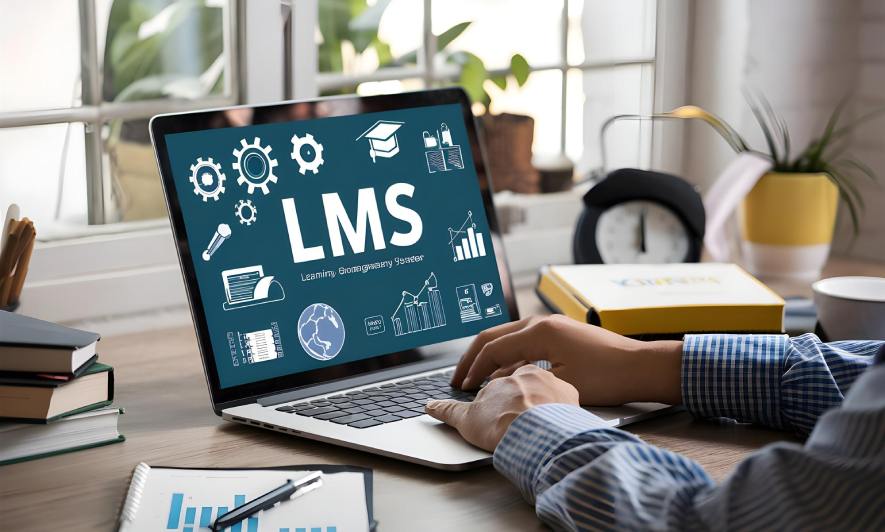Top 3 LMS Platforms for Hotel Staff
by Ankita Tripathy Business Published on: 31 October 2024 Last Updated on: 23 November 2024

The top three LMS platforms for hotel staff offer tailored learning modules specific to the hotel industry. These platforms may include interactive training and quizzes about things like hospitality management or safety protocols. The best LMS hotel system must also offer training courses or modules that teach staff members how to improve guest satisfaction.
A robust LMS hotel system can help with the onboarding process as well as ongoing employee training. This is especially beneficial for the hospitality industry as sometimes hotels must hire many new staff members simultaneously. Here are three of the top hospitality LMS providers to ensure hospitality staff are prepared to offer exceptional customer service.
1. Axonify
Axonify is an exceptional LMS that uses microlearning and AI-powered reinforcement to train frontline employees across several deskless industries. Many hotel employees have little time to spare for training, so to counter these problems, Axonify provides short, high-density, targeted training that lasts less than five minutes.
Some of the key features and advantages of using Axonify’s learning management system in the hospitality industry are:
Microlearning
Axonify delivers training content in bite-sized modules that employees can complete in just a few minutes. This is helpful for hospitality staff training because of typical time constraints that hotel staff may encounter, such as check-ins and check-outs or handling guest inquiries. With Axonify, hotel staff can learn while idling, resting, or between their working shifts.
Hospitality employees often have busy schedules and less time to retain information surrounding training. According to one study, microlearning can improve learning by 18%. Other sources cite even higher figures. Breaking down hospitality training into small digestible chunks is an effective way to maintain an employee’s attention and reinforce their knowledge over time.
Compliance Training
Axonify offers compliance training courses in a streamlined and efficient way. This keeps hospitality staff up-to-date on industry regulations and best practices. Compliance rules can be intricate, but Axonify makes it easier for managers and staff members to understand these rules by providing clear and concise training modules.
Hospitality-focused courses are generally provided annually. Yet, more is needed to prepare hospitality staff to avoid compliance blunders. Axonify reinforces compliance learning through consistent training, audits, and verifications that scale alongside any workforce size.
Gamification
Axonify stands out in the gamified learning experience using game elements like quizzes and rewards. This makes small-scale or corporate training fun and encourages friendly competition among coworkers. Participants earn points and badges by completing various challenges designed to test their knowledge through interactive training.
Hotel staff may find that gamification provides a “break” from their everyday duties. In this way, gamification offers a much more exciting learning platform than conventional approaches to training. Hotel managers can also follow each staff member’s learning progress and evaluate training efficiency based on data collected through gamification features.
2. Docebo Learning Management System
Docebo is a hospitality LMS that offers an online learning platform for hospitality staff through customizable learning paths. Its main objective is to increase engagement and productivity among customers, partners, and employees. Docebo provides a versatile platform that scales alongside growing hotel chains.
Some of the key features and advantages of using the Docebo learning management system in the hospitality industry are:
Customizable Learning Paths
The Docebo LMS adapts each hospitality staff member’s unique learning path using artificial intelligence (AI). Like a streaming service that analyzes a user’s watch history and suggests other movies or shows, Docebo does the same. It does this by learning how the employee interacts with content and their current position in the company.
This learning path also ensures that hotel staff are always in touch with the latest trends in guest service training. Docebo’s learning management system allows for the customization of the learning experience of each staff member. This level of personalization could positively affect guest service within the hotel sector.
Hybrid Learning
Docebo also enables a hybrid learning model that incorporates part traditional and part online learning. Hybrid learning may be helpful in cases where the hotel wants to combine digital learning with face-to-face training or practical exercises. This is sometimes called “blended learning” or a combination of traditional in-person classroom instruction with online training.
Hybrid learning helps hotels create more adaptive and individual-focused training modules for their employees. This is very useful because every employee has a different learning style and preferences. Docebo’s hybrid learning also allows for greater accessibility and convenience, as staff members can learn at their own pace.
Extensive Content Library
Docebo features an extensive library of high-quality content related to the hospitality business. These topics span everything from compliance management to customer care. Docebo’s library also features content that discusses critical food safety practices and helps staff members follow regulations.
Docebo contains programs highlighting diversity, equity, and inclusion (DEI). DEI plays an important role in the hospitality industry because it creates an inclusive workplace environment. This helps ensure that all staff members feel appreciated and respected.
Drawbacks to Docebo
Some may find Docebo one of the more complex learning management systems. This is particularly true for those who are not technically inclined. Likewise, Docebo’s user interface could give administrators and hotel managers a more significant learning curve than other LMS hotel systems.
3. Lingio Hospitality Training
Lingio is a learning management system that accelerates the delivery of appropriate employee training to frontline workers in the hospitality industry. Lingio emphasizes gamified, interactive mobile courses. This specific learning approach makes hospitality training fun, which may increase employee engagement and ideally reduce employee turnover.
Some of the key features and advantages of using the Lingio learning management system in the hospitality industry are:
On-The-Go Mobile Training
Lingio offers on-the-go training courses that hotel staff can access directly on their mobile phones. Lingo offers gamified courses to engage employees and encourage them to love learning. This type of on-the-go mobile training may increase job satisfaction among the customer service team.
Lingio’s mobile-first learning can also be easily integrated into a hotel employee’s busy schedule. By offering quick and convenient lessons that can be accessed on the go, Lingio allows hospitality staff to learn while remaining on the floor. Lingio’s Learning App is compatible with all mobile and laptop devices.
Rapid Course Development
Lingio’s AI course creation tools make developing training content easier. This tool’s notable characteristics include the ability to quickly convert almost any academic material (e.g. text, slides, or video) to an interactive and mobile-friendly version. These features cut down on the time it takes for a manager to create training courses.
This feature can also be used to create regular content that is appealing to staff members. Managers can create interactive features like quizzes and simulations to make learning more enjoyable. All of the content created can then be adapted to any mobile device.
Tracking Capabilities
Lingio is beneficial for hotel managers because it offers robust tracking to monitor employee training and compliance. With Lingio’s coaching portal, managers can distribute courses directly via an SMS link. This feature allows managers to track learning ROI and celebrate employee achievements.
Lingio’s tracking capabilities also allow managers to provide targeted feedback. This simple and intuitive interface allows managers to pinpoint areas where individual staff members need improvement. Lingio’s tracking capabilities potentially provide more efficient training and better performance levels among staff.
Drawbacks of Lingio
Some users may feel that Lingio presents a learning curve for less tech-savvy individuals. While Lingio was designed to be intuitive for its users, some functions may be challenging for managers and staff to use. Lingio can also be pricier than other LMS hotel systems, which may be a disadvantage for smaller hotel chains.
Choosing The Right LMS for Hospitality
A great LMS for hospitality will feature user-friendly interfaces and mobile compatibility. This makes it easy for frontline employees to access training materials on the go. Other essential features of LMSs for the hospitality industry are micro-learning gamification and comprehensive tracking capabilities.
Some of the best LMS systems are easy to navigate and integrate seamlessly with existing software systems. Axonify, Docebo, and Lingio are all excellent learning management systems for hotel staff training.
Additional Reading:



































































































